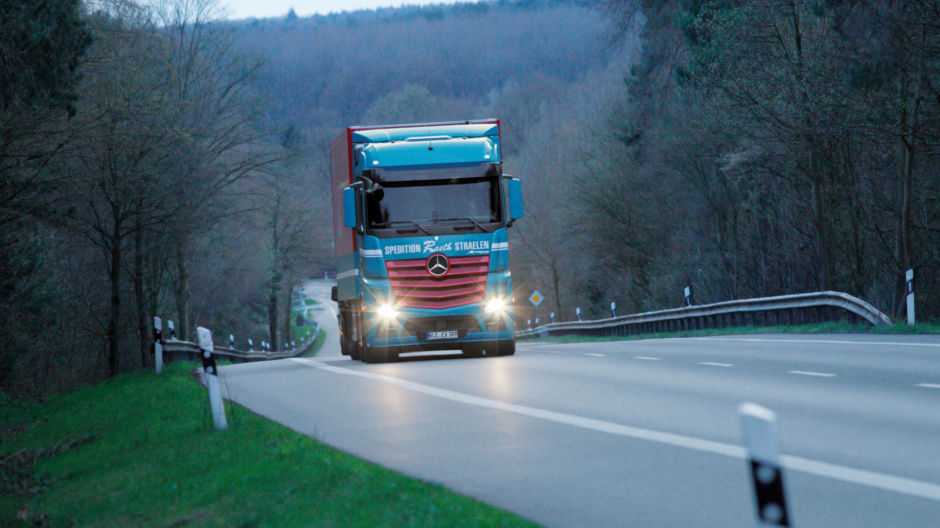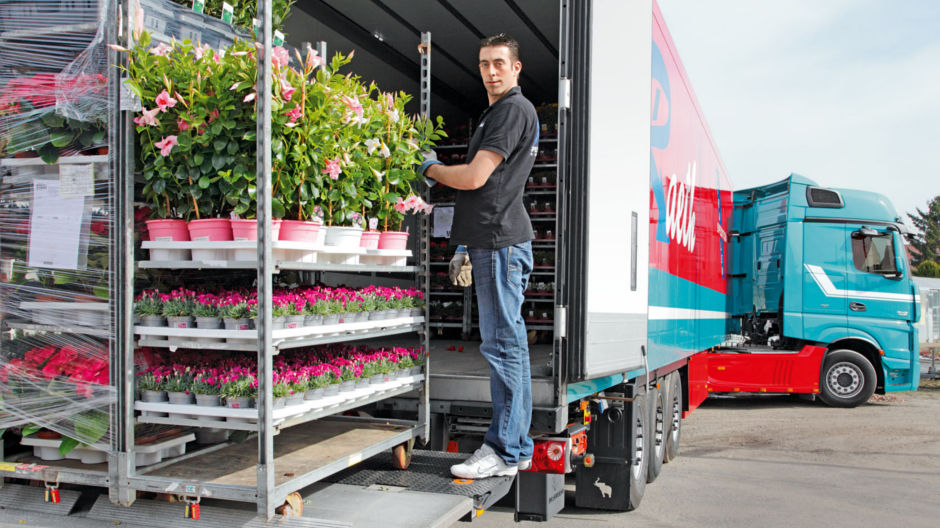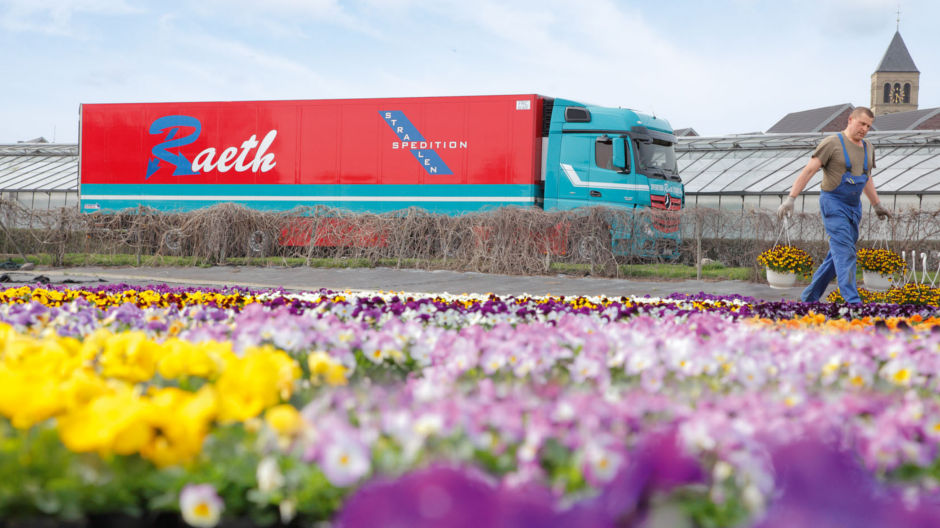
Better driving with Predictive Powertrain Control
Report
André Krantzen has no time to lose. He is carrying flowers, and they have to be fresh when they arrive. The assistance and safety systems of his new Actros make his work easier. One of these systems is Predictive Powertrain Control (PPC).

PPC gets active: the system detects the uphill gradient and lets the Actros roll over the top
Just before he reaches the Mönchengladbach junction, the white "12" in the lower right corner of the display of the instrument cluster turns into an "E". "Honestly, this still surprises me a little," says André Krantzen. Autobahn 61 here in the flatland of the Lower Rhine area does not go noticeably uphill or downhill – this is at least what the driver thought up to now. But this is exactly what is being signalled by the white "E": André is driving his new Actros up a slight incline towards a hilltop. This is why the Mercedes PowerShift 3 automatic transmission changes to EcoRoll mode. It lets the truck roll up and over the hill, not downshifting into 12th gear until the truck goes over the top and rolls gently downhill again.
The Predictive Powertrain Control (PPC) makes this possible. The assistance system supports the conventional cruise control by integrating a driving style to match the topography into the automatic programme. With the aid of 3D road maps and GPS data, the course of the uphill stretch is continuously computed. The system thus "sees" the uphill and downhill gradients, as well as depressions, ahead of the truck and makes the automatic transmission respond – with greater precision than a driver like André, who knows the area like the back of his hand, ever could. Here this means: PPC knows that the vehicle can negotiate the hilltop rolling, and therefore prevents the accelerator being depressed – which saves fuel. "The first time this situation came up, I thought something was kaput," says André, laughing as he operates the indicators to change to the A52 motorway heading for Düsseldorf. "But I quickly became accustomed to PPC. It helps me concentrate on the traffic even better."
The 27-year-old father of two girls drives for the forwarding agent Raeth in Straelen, a town in the Lower Rhine region west of the Rhine River. The most important goods hauled by the family-owned company, which operates 60 trucks, are flowers – potted flowers and seedlings as well as cut flowers. The Netherlands with their countless producers are a stone's throw away, and the German side of the border region is also a gardening district. In Straelen, huge quantities of goods are transshipped at Germany's biggest flower auction, Veiling Rhein-Maas. In the spring in particular, when the garden centres and DIY markets advertise flowers in their brochures, the order books at Raeth are filled to bursting – and the trips follow tight schedules, since the goods must arrive quickly and in fresh condition.
André took to the road in his new Actros 1842 Euro VI this noon at half past twelve from Veiling Rhein-Maas. The forwarding agency has an area of its own with four ramps in the huge building complex. The goods which the customers – wholesalers and retailers – buy at auction are brought there. In André's refrigerated semitrailer there are 28 wheeled trolleys – ten with cut flowers such as roses, the others with potted flowers, from the red-and-white "Candy Stripes" creeping phlox to the "Allium Gladiator" ornamental onion.

The trailer is unloaded in a jiffy – André loses no time at customer premises
The five-stage trip takes him a distance of 320 kilometres. The first station is a gardening firm in Düsseldorf, 62 kilometres away. A hairpin 180-degree turn leads to a ramp under the open sky. The gnarled olive tree at the turning point provides only limited orientation. All the same, André manages to complete the manoeuvre in just a few moves.
Unloading takes place as if it had been rehearsed. The driver rolls the first four trolleys with cut flowers off the truck into the yard and couples them together like railway wagons. A garden centre employee is waiting to hitch them to his tractor. After 20 minutes the job is done. And how do we get out of here again? "Back out!" is André's disarmingly quick and simple answer. Some 20 minutes later he merges onto the motorway again. He follows the same route back to collect more goods from the auction.
"We have a well-established customer base mainly in Germany and Switzerland," he explains. "But which of them gets how much and on which day – this is what our dispatchers usually don't know until just before the trip starts. It's a hectic business." So it matters all the more that André's new Actros has all available safety and assistance systems on board to facilitate his work. For instance, Stability Control Assist, Proximity Control Assist with stop-and-go function, and Active Brake Assist 3, which can also react to stationary obstacles.
Or PPC – which makes itself felt again as André bears down on the hilltop near Mönchengladbach. "It's important to actively work with the system. The keypads on the multifunction steering wheel make this very easy." For instance, it is imperative to keep an eye on the lower speed tolerance, known as the lower hysteresis. It is a major new feature of PPC and describes the limit to which the truck can be decelerated compared with the set speed. "The value must not be too low, otherwise you might become a hindrance in dense traffic."
André has selected 80 kilometres per hour as the target speed; as the lower hysteresis the display shows "-6". However, on the mild incline before the hilltop the truck only slows a bit. And on the gentle descent after passing the crest it does not accelerate to the upper hysteresis of "+4" set by the driver. To make active use of PPC additionally means deactivating it if need be – when approaching the end of a tailback or a construction site, for example. The system does not recognise either situation.

Very little space for manoeuvring – a familiar situation for André and his new Actros
Shortly after 3 p.m. André backs up to the platform in Straelen. The refrigerated semitrailer is fully loaded once more, and again the destination is Düsseldorf. The traffic on the motorway is now heavier than in the early part of the day. For the level floor of the BigSpace L-cab, André has had a cream-coloured, quilted leatherette floor covering made. "It looks good and is easy to clean – I'm rather fussy about that," he says with a chuckle. He has fitted red velvet curtains to the side windows and between his comfort suspension seat and the bed. No, he would not trade jobs with the colleagues at the office. Especially since he appreciates the new Actros not only for its living comfort. "What I like most is its perfect road holding. And the driving dynamics are impeccable."
The second discharge point in Düsseldorf again is a garden centre and just one street away from the first one. As to be expected, things are quite tight here too. The short access road is hardly wider than the truck. And as he did earlier in the day, after making the delivery André puts several empty trolleys back into the semitrailer which will be loaded with new flowers the next morning in Straelen.
The last destination for today is the wholesale flower market in Cologne. There is ample space here. With the convenience of a spacious multi-storey car park, André can drive into the building and make his stops at four customers in all, one after the other. It's early evening and the wholesale market is now empty. "It doesn't matter. I have keys for everything." André rolls most of the goods into temperature-controlled areas. However, one trolley containing splendid orchids and anthuriums displays a warning in A4-size lettering: Not in the cold room!
"Flowers really are special. There are all sorts of different species and varieties, and partly differing transport conditions must be observed for them," says André, as he sets off on the last 95 kilometres of the day back to Straelen. "As I usually have several kinds of flowers in the semitrailer, I have to set the cooling to a temperature which all of them tolerate." Occasionally he brings his wife a few plants for their own garden, he tells us. He knows many of his customers well and from some of them he occasionally gets plants for a euro or two in the coffee kitty. "I've even tried to grow geraniums myself, but it didn't work out." Instead of planting flowers he would rather continue driving them – no one can beat him at that.



Comment
Please log in to post a comment.
No comments yet